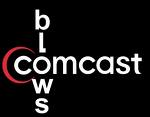by: Tom Corelis
Change of heart attributable to fears of further legislation

A panel of executives from AT&T and Verizon urged the FCC to take action in the ongoing Comcast BitTorrent saga, in order to show that legislation is not necessary in order to enforce “network neutrality” in the way ISPs manage their infrastructures.
Speaking at the NxtComm trade show in Las Vegas, AT&T senior executive vice president Jim Cicconi and Verizon executive vice president Tom Tauke implored the FCC to assert its authority and make a decision in the ongoing Comcast debate, which it has presided over since an investigation and series of town hall meetings earlier this year.
“It's in the best interest of the industry for the FCC to make a judgment on the Comcast/BitTorrent case,” said Tauke. “None of us want to be in a world where there is a sense that nobody is watching what is going on.”
The FCC has the ability to prove that Congress is adequately capable of enforcing the FCC’s policy of openness, agreed Cicconni.
“The Comcast case has brought the debate over Net neutrality into specifics,” said Cicconi, before noting that new laws based around a largely theoretical, hypothetical debate could be “disastrous” for the cellular industry.
An AP report on Comcast’s policy of “data discrimination,” released late last year, turned much of the internet and blogging community upside down as it was discovered that Comcast actively interfered with subscribers’ BitTorrent connections and made it impossible to “seed.” As consumer outrage mounted, theorists behind the ongoing Network Neutrality debate – which centers largely on future predictions of how ISPs choose to run a growing internet – suddenly had a real-world case to cite, adding weight to the arguments of neutrality’s proponents and furthering pressure on telecoms and ISPs.
Amidst fears of moving to a “tiered” internet infrastructure, where certain websites can get “premium” treatment by paying a toll of sorts to ISPs, internet providers are fighting long and hard to prevent the creation of additional laws governing how they run their networks. Traditionally, this also resulted in a hostile attitude towards FCC interference – but it appears that ISPs have begun to change their stance with the FCC amidst what might be an otherwise inevitable change.
While the FCC has yet to decide how it’s going to handle Comcast – a decision is expected sometime this summer – Comcast agreed to end its practice of “data discrimination” sometime within the next year, and announced joint ventures between BitTorrent, Inc – proprietors of the open BitTorrent protocol – and Pando Networks in order to seek ways to further optimize BitTorrent traffic.
